#Bandung conference
Text
Russian Perspective: PRC Foreign Policy 1949 - 1976
Foreign policy of the People’s Republic of China from 1949 to 1976
Внешняя политика Китайской Народной Республики в 1949 – 1976 гг.
by Andrei Olegovich Vinogradov – leading researcher of the Institute of the Far East, Russian Academy of Sciences, candidate of historical sciences.
The Institute of the Far East of the Russian Academy of Sciences is preparing to publish the 8th volume of the…

View On WordPress
#Africa#Bandung Conference#border#China#Chinese#Communist Party#Khrushchev#Korea#Korean War#lean to one side#Mao Zedong#peaceful coexistence#PRC#Sino-Soviet#Soviet Union#Third World#USSR#Vietnam#Vinogradov#Xinjiang#Zhou Enlai#中国
3 notes
·
View notes
Text
4月11日。1955年 - カシミールプリンセス号爆破事件

#Apr.11.1955#Kashmir Princess#People's Republic of China#Bandung conference#Zhou Enlai#assassination attempt#republic of china#Communist Party of China
1 note
·
View note
Text
youtube
Watch the American Climate Leadership Awards 2024 now: https://youtu.be/bWiW4Rp8vF0?feature=shared
The American Climate Leadership Awards 2024 broadcast recording is now available on ecoAmerica's YouTube channel for viewers to be inspired by active climate leaders. Watch to find out which finalist received the $50,000 grand prize! Hosted by Vanessa Hauc and featuring Bill McKibben and Katharine Hayhoe!
#ACLA24#ACLA24Leaders#youtube#youtube video#climate leaders#climate solutions#climate action#climate and environment#climate#climate change#climate and health#climate blog#climate justice#climate news#weather and climate#environmental news#environment#environmental awareness#environment and health#environmental#environmental issues#environmental justice#environment protection#environmental health#Youtube
6K notes
·
View notes
Text
Greatest Japan
Japan was warmly welcomed by representatives of Asian and African countries at the post-World War II "Bandung Conference". They stated that if Japan had not used the Greater East Asia Declaration as a pretext for war and had not fought for the sake of Asia, they would still be colonies of Britain, France, and the Netherlands. They believed that Japan had put a brake on Western civilization's excesses and was a country with a civilization that valued every individual regardless of social status.
0 notes
Text
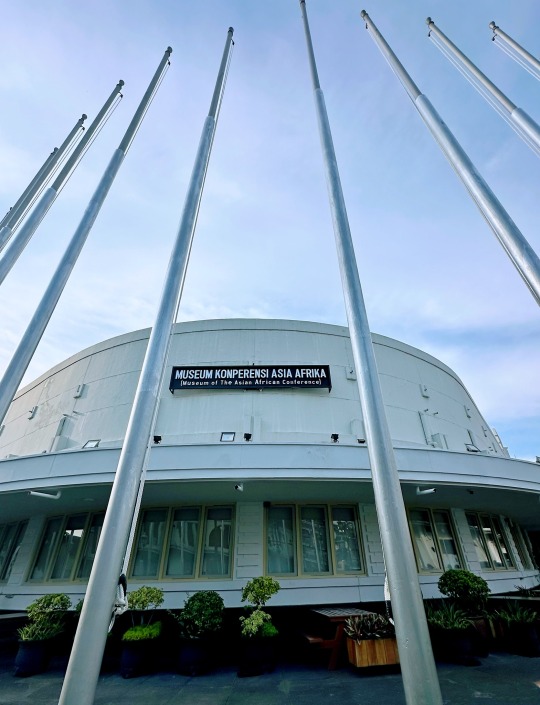
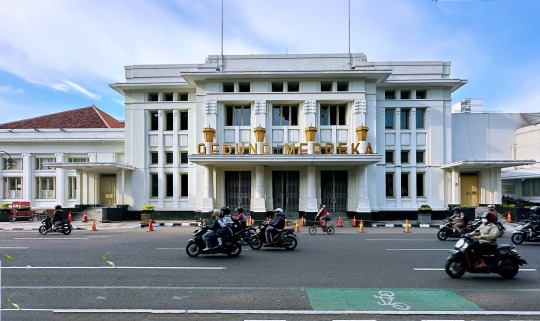
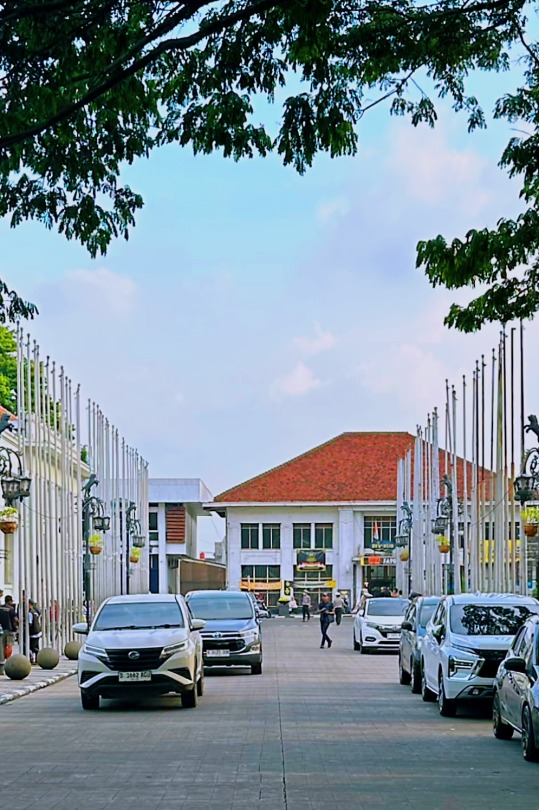
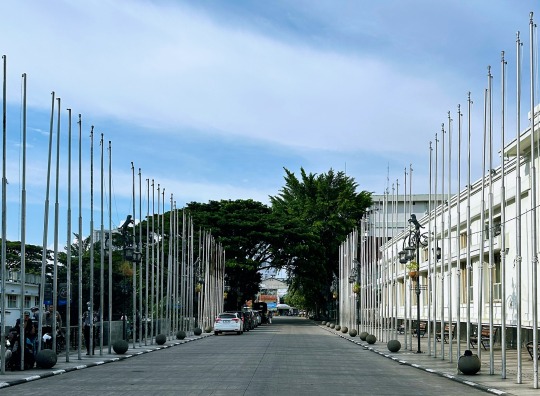
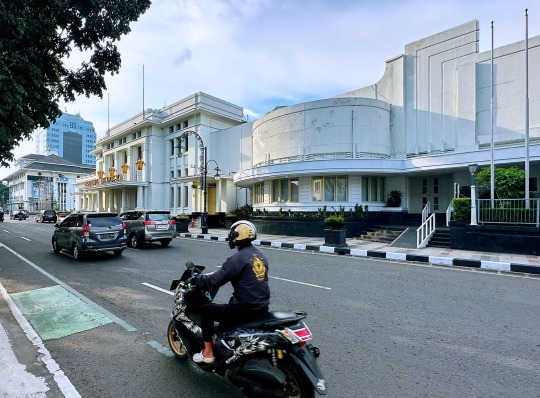
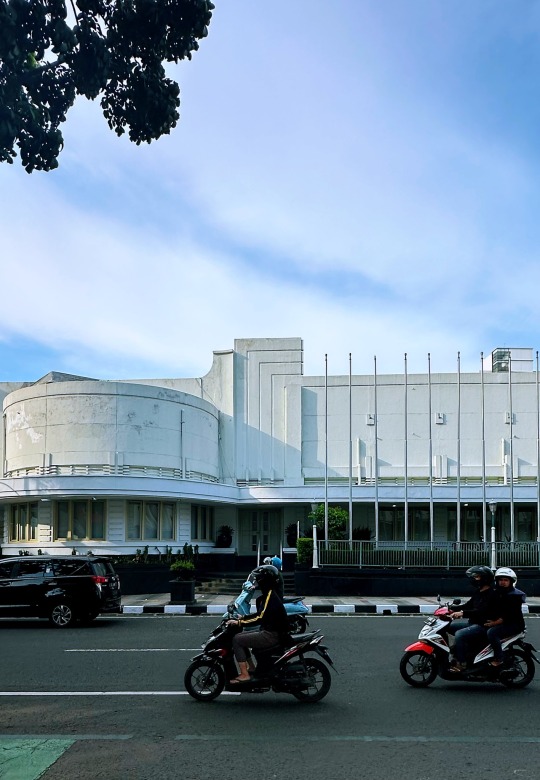
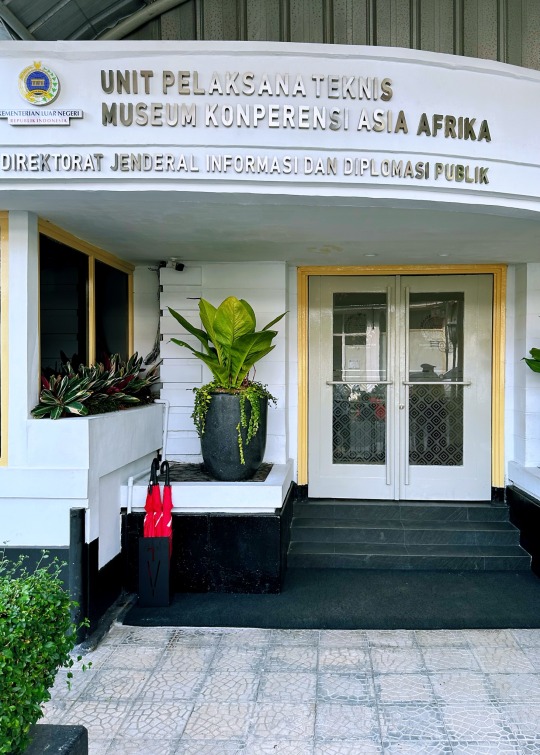
Visited the Independence Building in Bandung where the first Asian-African Conference or the Bandung Conference was held in 1955, without the presence of colonialist countries who preferred no equal dialogue but lecturing from so-called a position of strength, which USA is doing.
0 notes
Text
Since QV is talking about the groom from the Nogi shrine wedding again, here's a summary of relevant info:
Aside from the Yasukuni shrine related smears, ZZH was also accused of attending a wedding held in a "politically sensitive" shrine with "far right-wing Japanese nationalists" in attendance as wedding guests.
Is the Nogi shrine really politically-sensitive?
Not nearly as much as the slimeballs behind 813 want people to think. The shrine was dedicated to a Japanese commander called Nogi Maresuke who was involved in the Battle of Lushunkou in the First Sino-Japanese war. According to his Baidu page, he was the head commander of the battle and was the mastermind behind the Lushunkou massacre which took place right after. But all of that is actually incorrect. The real head commander was an entirely different person, a man called Oyama Iwao. Nogi was only the leader of the 1st Infantry Brigade and was under the command of Lieutenant General Yamaji Motogaru, who was in turn under the command of Oyama Iwao. And furthermore, before the battle of Lushunkou ended, Nogi was commanded to head up north to reinforce Jinzhou, so he wasn't even present when the the massacre happened.
So what happened here was that all that false information was edited into Nogi Maresuke's Baidu page on the evening of August 12. And the Nogi shrine's Baidu page did not exist at all before all of this and was only created at the same time Nogi Maresuke's page was edited. So when all the smears dropped and people went to Baidu to do some research, this is what they all saw. Before this, the Nogi shrine was only really known in China for one thing: it was a popular wedding venue.
Were there really far right-wing nationalists in the wedding?
One of these so-called right wing nationalists was an older male wedding guest who people claimed was Motoya Toshio, the president of APA group. APA group ('Always Pleasant Amenities') operates in the Hospitality industry and runs Japan's APA hotels. Now this Motoya Toshio dude actually is a piece of shit. Aside from being the president of APA group, he's also an essayist who writes and distributes political propaganda touting Imperial Japan's WW2 atrocities as "fabricated stories made to dishonor Japan". He distributes his essays and other material containing historical revisionism through his very influential APA group, so you can see why so many people hate this rotten piece of horseshit.
But that old man in the wedding was not him. As far as we know, the only thing they have in common is that they're both old asian men and that's apparently enough for people to claim they're the same person.

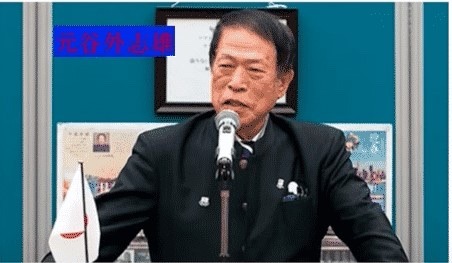
The other supposed "right-wing nationalist" was Madame Dewi, the wife of former Indonesian president Sukarno. According to the smears, her husband was anti-China and perpetuated the genocide against Indonesian-Chinese people, so she in turn must be guilty as well. But the reality is that the one responsible for the genocide was a man named Suharto. Their names may sound similar but these two men were very different. Sukarno, Madame Dewi's husband, was a friend to China and the founder of the Bandung Conference. In fact, a major reason why he was overturned was because of his pro-Communist position. And the very man responsible for it (and eventually replaced him as president) was Suharto, who then launched a bloody genocide targetting Indonesian-Chinese people and anyone he deemed "communist friendly". Suharto's rule was considered to be one of the most violent and corrupt dictatorships of the 20th century.
So what happened here was that Madame Dewi's Baidu page was edited, and her husband's name was changed from Sukarno to Suharto. And this falsified information was what people saw when they went to Baidu to research the validity of the smears. Plus, people were claiming that Madam Dewi was a high-ranking right-wing politician in Japan, when she's actually a celebrity and socialite who is largely uninvolved in politics.
People were also pushing the story that ZZH and Madame Dewi were close because they took a photo together, but it seems they did not know each other at all and she only took a photo with him for her blog (where she then criticized his oufit as being unsuitable for a wedding).
Back to the groom:
So at the height of the controversy, the groom posted an apology letter on his instagram account:
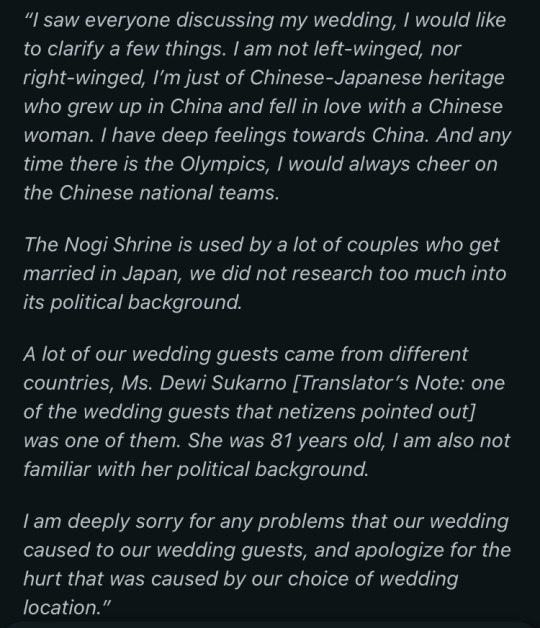
I grabbed this from a reddit post because the groom's IG account is now private and I can't be bothered to install the app again to verify. I don't even remember his username or even the password to my own account, so uh...
Also note that the post contains the misinformation on Nogi Maresuke and the Nogi shrine from the maliciously edited Baidu pages.
This seemingly well-meaning apology ended up indirectly "confirming" the false information surrounding the Nogi shrine and Madame Dewi. "Sorry I didn't research the history of the shrine, sorry I did not know Madame Dewi's political background,"
Apologizing like this seemed to suggest that the falsified info was legitimate. It essentially had the same problem as ZZH's apology letter, which frustrated the fandom at the time as it was such a dumb move and only ended up making it look like he was admitting that the smears were correct. There's speculation that the apology letter was not actually from ZZH (or if it was, he was deliberately counseled in bad faith). The statement he gave months later in the presence of other government officials and Li Xuezheng, where he asserted his innocence, was a much better one.
At the time, it was believed by the fandom that the groom had panicked, and in his haste to defend ZZH, did not have time to fact-check the claims or reach out to a lawyer or PR firm. So while his apology only added to the flames, nobody really held it against him. But recently QV pointed out that the groom is friends with an influencer who had a hand in spreading the smears. The groom follows the influencer on social media and QV says (I have no idea how she knows of this, just keep that in mind) that they are also friends in real life. If true, then it's something to consider. Because the groom's "apology" absolutely did add fuel to the flames, and if he had only clarified—truly clarified—instead of apologizing for things that weren't true and making them look true, it really would have helped ZZH in that moment. And if there is a chance his terrible apology was made terrible on purpose....well.
65 notes
·
View notes
Text
21st century Bandung conference when. 21st century Abdel Nasser when. 21st century Iranian, Cuban, Soviet, Chinese Revolutions to transform the global power balance & crush the capitalist & colonialist forces when !!!!!!!! 2024 please save humanity.
11 notes
·
View notes
Text
yk i don’t want to come across as snippy or bitchy with prev anon which is why I held back on my response to make it kinda funny... but i slept it off, feel more refreshed now, and i still feel irritated by it.
it is so incredibly grating that every time i (and others in similar position) identify racism/racial bias the response is always a counter that ignores the existence of racism. historical hetalia is actually quite popular within this space and honestly erotic art isn’t (because of the 2018 ban and tbh and understandably not a lot of people are comfortable posting porn or suggestive art on their blogs). so i present a follow-up question: whose history receives attention?
it just feels deliberately obtuse to pretend that race doesn’t exist because if i had centered white people in my historical artwork it would’ve performed well. and i have evidence: my yugoslav doodles. now obviously they didn’t perform as well as amelia since serbia and croatia are rather niche canon characters (and i acknowledge the difference in recognition within european regions) -- however, i think it’s very telling that they outperformed significantly compared to my colombo conference and undivided pakistan & china at bandung pieces. what is the difference here? china is a main character in the latter and india and indonesia are both canon and recurring characters in the former. i think the answer is obvious unless you are deliberately trying to factor out race.
we have to stop pretending like race and western bias does not play a role in shaping our likes and interests. racial/colonial bias is not something that exists within a vacuum or manifests only in bigots. it’s insidious, it’s structural, it’s psychological. racism is hard to identify for those not specifically affected by it and that’s purposeful. so it’s paramount to not dismiss it as a factor when identified by someone who is.
#disk horse#not art#rant#and before someone brings out the idpol im fully aware of how poc of different racializations can dismiss each other.#this isn't about anon specifically btw#anon if ure reading this do not take this personally. this is a structural issue
42 notes
·
View notes
Text
I’m not answering the anons because they’re filled w/ vile things but yes, India was historically pro-Palestine. India was historically a lot of things. Famously the only person at the Bandung conference to observe that it was a failing that there was no Black American delegate was Nehru. Yes yes history is fascinating and filled with so many things. We’re here now
17 notes
·
View notes
Text
ok, so I am studying anti colonialism in school rn and we are learning about the Bandung conference. I love learning about anti-colonialism so I am just gonna post it here because I can
@timetravellingkitty
reminder: I am not a historian. I am some high school student who likes history. this essay is not proofread. I wrote this to the best of my academic ability but I do not guarantee that everything is historically accurate. this is mostly just a practice on writing academic texts that I thought would be fun the share.
my sources:
Wright, Richard. "the Color Curtain: a Report on the Bandung Conference, (1956)." in "Sources For World in the Making," 419-420.
Wright, Richard. "the Color Curtain: a Report on the Bandung Conference , 1956." in "Voices of Decolonization", 67-70.
According to Richard Wright, the Bandung Conference was important because it brought together countries and people from around the world and united them under a shared experience. This experience being that they were all subjected to colonial rule in their country's past.
Richard Wright felt that the Bandung Conference was significant because it was the first time in history a conference was held by mainly people of color specifically to discuss the effects of colonialism and how to find a solution to the global conflicts happening between the two world superpowers of the US and the USSR. Richard states that “There was something extra-political, extra-social, almost extra-human about it; it smacked of tidal waves, of natural forces…” (Richard Wright p.419) when describing the conference. In his eyes, the Bandung conference was a unification of peoples from across the globe. These people may not have a lot in common, but Sukarno was able to unify them through shared racial experiences that they could all relate to because of their country’s subjugation to white rule.
Wright also felt that the Bandung conference was significant because it was proof that if the new countries banded together they could be a formidable force against colonialism and against the Cold War. He noted that when he first heard about the conference, he calculated the combined populations of the people in the countries that would be attending, and he was astonished. He realized that the people attending the conference represented the forgotten populations of the world. They represented the people who had long been oppressed and had been long suffering due to the effects of colonialism. In his eyes, this conference represented a combined rebellion against the status quo. He quotes Sukarno’s speech where he stated that “For many generations our peoples have been the voiceless ones in the world. We have been the unregarded, the peoples for whom decisions were made by others whose interests were paramount, the peoples who lived in poverty and humiliation…” (Sukarno p.68)To Wright, the Bandung conference represented the world’s underdogs finally standing up for themselves and taking control of their power that was taken away from them generations ago. They realized that the colonizers were never going to give that power back to them, so they decided to take it back themselves.
3 notes
·
View notes
Text
The next test of whether top U.S. adversaries can erode its role as the leading global superpower will come in the form of a major diplomatic confab in South Africa.
Next week, leaders of the so-called BRICS group—Brazil, Russia, India, China, and South Africa—will convene in Johannesburg for a major summit, where Moscow and Beijing aim to solidify a counterbalance to the Western-led international system. Both Russia and China are keen to breathe new life into the BRICS bloc to show the world that there are alternatives to the patchwork U.S.-led alliances and institutions that have dominated global affairs for decades.
There’s clearly a growing appetite among other countries for an alternative to the U.S.-led system: Some 40 countries, from Argentina to Saudi Arabia to Kazakhstan, have voiced interest in joining BRICS, while more than 67 world leaders and dignitaries were invited to next week’s summit.
“The global south will be watching next week’s BRICS summit closely in the hopes that the rising grouping of global and middle powers makes some progress in filling the considerable gaps left by America’s shoddy global governance,” said Sarang Shidore, director of the global south program at the Quincy Institute think tank. Even as emerging-market economies reel from the shocks of the pandemic and Russia’s war in Ukraine, Washington has offered little support, instead pursuing an aggressive campaign of interest rate hikes that has exacerbated economic turmoil around the world.
Next week’s summit harkens back to the days of the Bandung Conference, where 29 governments from Asia, Africa, and the Middle East assembled during the Cold War and laid the groundwork for the nonaligned movement. Like then, BRICS serves as an alternative, if inchoate, effort to push back against the hegemon of the day—albeit one that has been complicated by China’s and Russia’s membership.
“BRICS has tapped into a demand that wasn’t being met elsewhere,” said Rebecca Ray, a senior researcher at the Boston University Global Development Policy Center, who noted that countries that aren’t even applying for membership are attending the summit in Johannesburg. “The question is: What do they want their role to be in responding to that?”
There’s no clear answer yet. And experts don’t expect one to emerge from the upcoming summit, with few details yet released on the agenda or real deliverables. Complicating the matter is the fact that BRICS countries have vastly disparate national interests, and vague proposals to expand the bloc’s membership and economic influence seem poised to stumble out of the gate.
India and China are at loggerheads; South Africa is caught between a diplomatic rock and a hard place over its ties to Russia amid the war in Ukraine; and Brazil has done little to stick its neck out for Russia, despite its historically nonaligned foreign policy. All BRICS countries, even China, face economic headwinds that make any future plans to challenge the U.S.-led Group of 7’s spot at the top of the global economy more pipe dream than reality.
The grouping is currently in a “sweet spot, where it’s fulfilling its role, it helps members constrain the United States to some extent, [and] it strengthens ties between the BRICS,” said Oliver Stuenkel, a professor at the School of International Relations at Brazil’s Fundação Getulio Vargas. “But I think if there’s more ambitious projects, then it will inevitably strain this grouping and expose the divergences.”
For Russia, the BRICS summit is an opportunity to demonstrate that it no longer needs the West following Western efforts to isolate Moscow on the world stage in the wake of its bloody war in Ukraine. But that opportunity comes with an awkward footnote: Russian President Vladimir Putin is no longer attending in person as he has a warrant out for his arrest over war crimes in Ukraine from the International Criminal Court (ICC). South Africa, as a member of the ICC, would have been legally obligated to honor the arrest warrant.
China, meanwhile, is keen to position itself as the de facto leader of the global south and the friend of choice to countries worldwide that feel they have been undervalued or left behind by Washington and its most powerful and wealthy allies in Europe and Asia. Beijing has long pushed for the grouping’s enlargement, even though its ambitions have sparked pushback from other BRICS members.
“China is the only country that is not concerned at all about diluting the prestige of BRICS” by expanding it to more countries, Stuenkel said. “For China, I think it really makes sense to expand so that the BRICS can become an element in a more China-centric order—a Chinese-led system of different structures like the One Belt, One Road; the Asian Infrastructure Investment Bank; [and the] BRICS bank,” he said, referring to China’s leading global infrastructure investment program, the Chinese-backed multilateral lender, and the nascent New Development Bank established by BRICS countries just under a decade ago.
Yet Beijing has had a harder time getting the other BRICS members on board, further underscoring their competing visions of the group’s future. The idea of expansion has worried India and Brazil in particular, both of which have taken pride in the group’s exclusivity and fear that an open door will diminish its prestige.
“Brazil is very proud of its BRICS membership,” Stuenkel said. “If you’re part of a very exclusive club, it makes sense that you don’t want to see the club becoming open to everyone.”
One major proposal some leaders have floated ahead of the summit is developing a BRICS common currency to hedge against the U.S. dollar, although it is not on the summit’s agenda and experts are highly skeptical of the plan. Economist Jim O’Neill, who first coined the BRICS term in 2001, blasted the idea of a BRICS currency as “ridiculous” and “absurd” earlier this week.
“The idea that five countries with very divergent interests and trajectories can somehow form a coherent enough union to expand its membership and stand up this hare-brained idea of a BRICS currency seems really far-fetched to me,” said J. Peter Pham, a former U.S. diplomatic envoy to African regions during the Trump administration. “I don’t expect anything of substance to come out of this summit, unless you consider the lack of substance as itself politically substantive.”
Still, even without a common currency, Beijing has capitalized on the BRICS grouping to boost its long-standing bid to internationalize the renminbi and slash its dependence on the dollar. In the run-up to the BRICS summit, a growing number of countries, including Brazil and Argentina, have used the renminbi in trade to cope with a shortage of dollars and curry favor with Beijing. These efforts are set to continue long after Johannesburg, with BRICS countries expected to deliberate how to ramp up the use of local currencies in trade at the summit. They are also set to discuss a potential common payments system and committee focused on a joint currency—although experts don’t expect any challenges to the existing global financial architecture.
Talk of a BRICS common currency is “really a reflection of a desire among some segments of the world to have some counterweight to the U.S., the U.S. economy, the dollar,” said Daniel McDowell, an expert in international political economy at Syracuse University. But “I think most of this is just in fantasy land, because I don’t see any world in which it is really going to emerge in the way some people might hope.”
4 notes
·
View notes
Text
THE JAPANESE PERIOD

Carlos P. Romulo, in full Carlos Peña Romulo, (born January 14, 1899, Camiling, Philippines—died December 15, 1985, Manila), Philippine general, diplomat, and journalist known for his activities on behalf of the Allies during World War II and his later work with the United Nations.
In 1931 Romulo was made editor in chief of TVT Publications, comprising three newspapers, one in English, one in Spanish, and one in Tagalog (the second most prevalent language in the Philippines). In 1937 he became publisher of another chain of newspapers.
When Japan attacked the Philippines in 1941, he became an aide-de-camp to U.S. Gen. Douglas MacArthur on Corregidor Island, and his broadcasts became widely known as the “Voice of Freedom.” After Japan captured Corregidor, Romulo went with MacArthur to Australia and then joined the Philippine government-in-exile of Pres. Manuel Quezon in Washington, D.C., as secretary of information.
In 1941 Romulo won the Pulitzer Prize for Peace for his prewar evaluations of the military situation in the Pacific area. He returned to the Philippines with U.S. forces in 1945. In 1948 he served as president of the United Nations Conference on Freedom of Information in Geneva.
Romulo was president of the General Assembly of the UN (1949–50) and in 1950 became secretary of foreign affairs of the Philippines. In 1952 he was named ambassador to the United States. No longer satisfied with the politics of the incumbent Liberal Party, he decided in 1953 to run for the presidency of the Philippines on a third-party ticket, but he withdrew to become campaign manager for the successful Nacionalista Party candidate, Ramon Magsaysay. At the Bandung Conference of Afro-Asian countries in 1955, he criticized the tyranny of both communist rule and Western colonialism.
Reference: Encyclopedia Britannica
https://www.britannica.com › Carlos...
Carlos P. Romulo | Filipino diplomat
2 notes
·
View notes
Text
SEAPAVAA poster - expanded cinema in the Asia Pacific
There’s a book from 2017
Jurriëns, Edwin. Visual Media in Indonesia : Video Vanguard. Abingdon, Oxon: Routledge, an imprint of the Taylor & Francis Group, 2017. Print.
There is an exhibition catalogue for this work By Krisna Murti https://www.youtube.com/@TheKrisnart
Learning to queue up to the ants (status queue) = Belajar antri kepada semut : performance video installation, Soemardja Gallery-Bandung Institute of Technology, December 10-23, 1996.
https://www.cobosocial.com/dossiers/krisna-murti-interview/
Experimental Film Forum in Singapore https://expcinema.org/site/en/directory/experimental-film-forum
2010 A new festival is born in Singapore. The first edition of Experimental Film Forum, subtitled 'Experiments in progress...' will be held next May 20-23 at the Substation Theatre. Highlights include a programme of local experimental films curated by filmmaker Victric Thng with emphasis on the work of Tania Sng; a workshop and screening on S8 films directed by Russel & Gozde Zehnder; a panel on the history of experimental films in Southeast Asia, the recent spate of experimental films and the direction of experimental cinema; and a symposium on distribution and the 'Human Frames' project by Lowave co-founder and filmmaker Silke Schmickl.
https://www.objectifs.com.sg/experimental-cinema-in-southeast-asia-panel-discussion/
EYE Film conference 2022
Umi Lestari - Indonesian cinema scholar
Kultursinema as a method - Mahardika Yudha - program in Arkipel - Jakarta Intl Doc and Experimental Film Festival - Arkipel due May
Southeast Asia film festival Thailand December https://www.southeastasiafilmfestival.com/
2017 - experimental film in Manila
https://www.gmanetwork.com/news/lifestyle/artandculture/600799/fdcp-s-xperimento-pelikula-to-screen-13-experimental-films-for-free/story/
FDCP’s Xperimento Pelikula to screen 13 experimental films for free - Xperimento Pelikula" curates 30 years of avant-garde works from Miko Revereza, Melchor Bacani III, Rox Lee, Ramon Jose "RJ" Leyran, John Torres, Yason Banal, Tad Ermitano, Raya Martin, Tito & Tita, Martha Atienza, Jon Lazam, Cesar Hernando, Eli Guieb III, and Jimbo Albano.The films were made in workshops held by the Mowelfund Institute and Goethe Institut Manila in the '80s and '90s, which Shireen Seno of Los Otros and Merv Espina of Generation Loss sifted through.
Los Otros, building experimental film in the Philippines
https://www2.bfi.org.uk/news-opinion/sight-sound-magazine/interviews/los-otros-shireen-seno-john-torres-interview-experimental-film-community-philippines
Asian Film Symposium https://www.objectifs.com.sg/afs2015/
Singapore, Substation
Video art histories south east Asia
https://asialink.unimelb.edu.au/arts/resources/stories-and-insights/the-rise-of-video-art-in-east-asia
Refocusing on the Medium: The Rise of Video Art in East Asia at OCAT Shanghai, assembled 25 works from key protagonists in video art from Japan, Korea, Taiwan, Hong Kong, and mainland China.
OCAT Shanghai, 27 December 2020 – 21 March 2021Artists
Katsuhiro Yamaguchi, Nam June Paik, Yoko Ono, Keigo Yamamoto, Kim Kulim, Takahiko Iimura, Shigeko Kubota, Park Hyunki, Soungui Kim, Wang Gongxin, Ellen Pau, Chen Shaoxiong, Geng Jianyi, Zhu Jia, Yuan Goang-Ming
Curator
Kim Machan (Director, Media Art Asia Pacific MAAP Brisbane)
Publication date: May, 2021, commissioned by Asialink Arts.
https://www.maap.org.au/collaborator/kim-machan-2/
Bangkok experimental video https://en.bacc.or.th/archive/336.html
Running for a long time, curator Komson Nookiew
https://knookiew.blogspot.com/
Asst Prof Komson Nookiew Fine Art Department,
King Muangkut's Institute of Technology, Ladkrabang, Bangkok
Experimental film festival 2012 beff https://expcinema.org/site/en/directory/bangkok-experimental-film-festival
2 notes
·
View notes
Text
Kunjungan Kerja Tertutup R.NET Group di 2 kantor pusat Kementerian RI
Jakarta, 30 Desember 2022, Owner & CEO PT. Rangga Net (R.NET Group | [setelah mengambil alih Cahaya Ras]) Bapak Muhammad Rangga Wardani melakukan kunjungan kerja bersama rombongan elit handal dari 6 divisi berbeda ke kantor pusat Kementerian Komunikasi dan Informatika Republik Indonesia dan kantor pusat Kementerian Koordinator Bidang Pembangunan Manusia dan Kebudayaan Republik Indonesia usai mengikuti Conference of Tech 2022 yang diselenggarakan oleh Alumni serta pejabat dan jajaran Institut Teknologi Bandung (ITB).

Tujuan dari kunjungan kerja ini adalah Kementerian Komunikasi dan Informatika pusat berharap agar R.NET Group beserta mitra-mitranya terutama dibidang Teknologi Informasi untuk terus bersinergi membangun sistem yang kuat untuk melindungi Negara Kesatuan Republik Indonesia. Dan juga Ketua Eksekutif R.NET Group bermaksud untuk bermitra dengan PMK RI Prof. Dr. Muhadjir Effendy, M.A.P. selaku Menteri Koordinator Bidang Pembangunan Manusia dan Kebudayaan agar dapat mengkoordinasikan dan mengontrol penyediaan jalur hijau untuk memperluas jangkauan Cahaya Ras melalui jaringannya.
"Semoga kerjasama ini dapat dipertahankan kedepannya dan berjalan dengan baik. Sebelum saya kembali, saya harap Anda bersedia mempromosikan beberapa merek, baik murni dari Kami maupun beberapa perusahaan yang telah kami ambil alih." - ujar Pak M. Rangga Wardani Owner & CEO R.NET Group
Kunjungan Kerja ini hanya berlangsung satu hari pada tanggal 30 Desember 2022 hingga pukul 16.00 WIB. Para karyawan diantar kembali ke R.NET Group Tower pusat bersama dengan pengawal elit terlatih untuk menjaga keselamatan mereka dan Pemilik & CEO R.NET. Usai mengantarkan para karyawan, Protokoler pun melanjutkan perjalanan mengiringi pimpinan menuju Bandar Udara Internasional Soekarno–Hatta berangkat kembali ke Ternate pada pukul 17.05 WIB.
Author:
Kevin Pradana
4 notes
·
View notes
Text

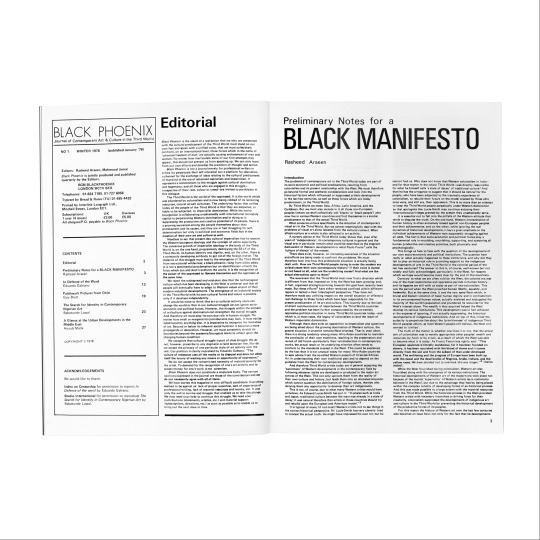

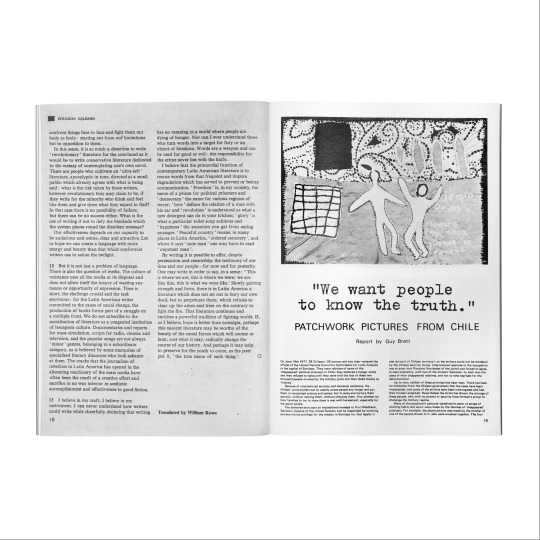
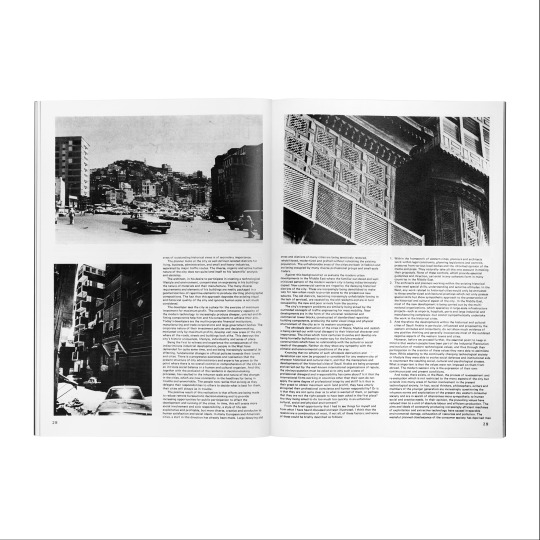





2022年7月24日
【新入荷・新本】
Black Phoenix: Third World Perspective on Contemporary Art and Culture, 2022, Primary Information
108 pages. 8.3 x 11.8 inches. Paperback. Edition of 2500.
Editors: Rasheed Araeen and Mahmood Jamal
Managing Editor: Rachel Valinsky
Managing Designer: Dan Bourke
価格:3,520円(税込)
/////
1978年から1979年にかけて、Rasheed AraeenとMahmood Jamalによってイギリスで編集・発行された雑誌「Black Phoenix」全3号を1冊にまとめて復刻。「Black Phoenix」は、ビジュアルアート、文学、アクティビズム、そしてそれ以外の分野においても、トランスナショナルな連帯と文化生産に関する重要かつラディカルな文書として今日でも参照されています。
1960年代の解放運動、西洋の帝国主義と(新)植民地主義を解体するためにアフリカ、アジア、ラテンアメリカの国々の間で社会的・政治的な連携と連帯を求めた歴史的なアジア・アフリカ会議(バンドン会議)と三大陸人民連帯会議から10年以上を経て、「Black Phoenix」は第三世界全体で解放の芸術と文化運動の形成を呼びかける声を発しました。「Black Phoenix」は、1970年代後半以降のイギリスにおける反人種主義、反帝国主義の意識の高まりの中心に、ディアスポラや植民地の歴史を位置づけ、その後の10年間に人種、階級、ポストコロニアル理論に関する繊細で複雑な言説を生み出すことになります。「Black Phoenix」は、第三世界と西洋を横断し、人種の二項対立を超えた黒人の地平を提示しました。
This publication is a compilation of all three issues of the journal Black Phoenix published as a single volume. Edited and published by Rasheed Araeen and Mahmood Jamal between 1978 and 1979 in the United Kingdom, Black Phoenix remains a key and radical document of transnational solidarity and cultural production in the visual arts, literature, activism, and beyond.
More than a decade after the liberation movements of the 1960s and the historic Bandung and Tricontinental Conferences, which called for social and political alignment and solidarity among the nations of Africa, Asia, and Latin America in order to dismantle Western imperialism and (neo)colonialism, Black Phoenix issued a rallying cry for the formation of a liberatory arts and culture movement throughout the Third World. International in scope, Black Phoenix positioned diasporic and colonial histories at the center of an evolving anti-racist and anti-imperialist consciousness in late 1970s Britain and beyond—one that would yield complex and nuanced discourses of race, class, and postcolonial theory in the decade that followed. Black Phoenix proposed a horizon for Blackness that transcended racial binaries, across the Third World and the West.
Contributors include art critics, scholars, artists, poets, and writers, including Rasheed Araeen (Pakistan) and Mahmood Jamal (Pakistan), Guy Brett (United Kingdom), Kenneth Coutts-Smith (United Kingdom), Ariel Dorfman (Chile), Eduardo Galeano (Uruguay), N. Kilele (Tanzania), Babatunde Lawal (Nigeria), David Medalla (Philippines), Ayyub Malik (Pakistan), Susil Siriwardena (Sri Lanka), and Chris Wanjala (Kenya).
Rasheed Araeen is a Karachi-born, London-based artist, activist, writer, editor, and curator. Aareen founded the critical journals Black Phoenix, Third Text, and Third Text Asia, and took on activist roles with the Black Panthers and Artists for Democracy. His work has been exhibited widely, including, most recently, at the Pulitzer Arts Foundation, Chicago; BALTIC Centre of Contemporary Art, Gateshead; MAMCO, Geneva; Van Abbemuseum, Eindhoven; Tate Britain, London; the 2017 Venice Biennale; and Documenta 14, Athens/Kassel, among others.
Mahmood Jamal was born in Lucknow, India, and moved to Britain from Pakistan in 1967. He published several books of poetry, including Sugar Coated Pill (2007), and translated the Islamic Mystical Poetry: Sufi Verse from the Early Mystics to Rumi (2009) and Faiz: Fifty Poems (2013), among other titles. In 1983, he co-formed the all-Asian Retake Film and Video Collective production company, and initiated Epicflow Films in 1989. Jamal worked as an independent producer and writer; produced several documentary series, including Islamic Conversations; was a lead writer on Britain’s first Asian soap, Family Pride (1991–92), and wrote and produced Turning World (1996) for Channel4 television. He died in London in December 2020.
4 notes
·
View notes
Text
Events 4.24 (after 1930)
1932 – Benny Rothman leads the mass trespass of Kinder Scout, leading to substantial legal reforms in the United Kingdom.
1933 – Nazi Germany begins its persecution of Jehovah's Witnesses by shutting down the Watch Tower Society office in Magdeburg.
1944 – World War II: The SBS launches a raid against the garrison of Santorini in Greece.
1953 – Winston Churchill is knighted by Queen Elizabeth II.
1955 – The Bandung Conference ends: Twenty-nine non-aligned nations of Asia and Africa finish a meeting that condemns colonialism, racism, and the Cold War.
1957 – Suez Crisis: The Suez Canal is reopened following the introduction of UNEF peacekeepers to the region.
1963 – Marriage of Princess Alexandra of Kent to Angus Ogilvy at Westminster Abbey in London.
1965 – Civil war breaks out in the Dominican Republic when Colonel Francisco Caamaño overthrows the triumvirate that had been in power since the coup d'état against Juan Bosch.
1967 – Cosmonaut Vladimir Komarov dies in Soyuz 1 when its parachute fails to open. He is the first human to die during a space mission.
1967 – Vietnam War: American General William Westmoreland says in a news conference that the enemy had "gained support in the United States that gives him hope that he can win politically that which he cannot win militarily".
1970 – China launches Dong Fang Hong I, becoming the fifth nation to put an object into orbit using its own booster.
1970 – The Gambia becomes a republic within the Commonwealth of Nations, with Dawda Jawara as its first President.
1980 – Eight U.S. servicemen die in Operation Eagle Claw as they attempt to end the Iran hostage crisis.
1990 – STS-31: The Hubble Space Telescope is launched from the Space Shuttle Discovery.
1990 – Gruinard Island, Scotland, is officially declared free of the anthrax disease after 48 years of quarantine.
1993 – An IRA bomb devastates the Bishopsgate area of London.
1994 – A Douglas DC-3 ditches in Botany Bay after takeoff from Sydney Airport. All 25 people on board survive.
1996 – In the United States, the Antiterrorism and Effective Death Penalty Act of 1996 is passed into law.
2004 – The United States lifts economic sanctions imposed on Libya 18 years previously, as a reward for its cooperation in eliminating weapons of mass destruction.
2006 – Bombings in the Egyptian resort city of Dahab kill 23 people and injure 80.
2005 – Cardinal Joseph Ratzinger is inaugurated as the 265th Pope of the Catholic Church taking the name Pope Benedict XVI.
2011 – WikiLeaks starts publishing the Guantanamo Bay files leak.
2013 – A building collapses near Dhaka, Bangladesh, killing 1,129 people and injuring 2,500 others.
2013 – Violence in Bachu County, Kashgar Prefecture, of China's Xinjiang results in death of 21 people.
0 notes
Text
A few words on the Arab cold wars...
Will expand when I have time on the objectives of China and Russia (and the general policy of the United States) in the region re: their diverse approaches to foreign policy and great power competition
3 notes
·
View notes